Entrepreneur of the Week: Maxime Balsat (M.16) Advocates for Greener Works Councils

With his agency Représente.org, Maxime Balsat is contributing to the ecological transition by encouraging works councils to offer employees more sustainable activities and less polluting vacations than a trip to the other side of the world.
11 billion. That’s the figure highlighted by Représente.org, the company Maxime Balsat founded three years ago. Based on a study by Gilles Caire, an economics researcher at the University of Poitiers, the sum represents the amount of money that flows annually through companies’ Social and Economic Committees (CSE). Made up of employee representatives, these structures provide workers with discounted trips, gift cards, and other perks. Managing their budgets is a niche that the entrepreneur has decided to green.
He calls his company “the agency of joyful ecology for works councils.” Optimistic and technical, Maxime, 32, was born in Saint-Étienne. The son of a copper factory manager, he first developed a passion for made in France. After an internship at the French Agency for International Investments while studying at Sciences Po, this rugby enthusiast helped create the Independent Federation of Made in France (FIMIF) in 2015. “I was working with real entrepreneurs who wanted to join forces to build a made in France lobby,” he explains. “The investment side really appealed to me, and I wanted to dig deeper into finance.”
From Investor to Entrepreneur
After earning a Master’s degree in Managerial & Financial Economics at HEC, he became a private equity investor for a fund specializing in French industrial SMEs. “A very interesting job—intellectually stimulating, well-paid, and intense,” he says. “I understand why it attracts so many people.” Through this work, he developed in-depth knowledge of highly specialized industries—such as the production of quick couplers for hydraulic excavators. “There are only three companies in the world that manufacture them,” he notes. “A true sub-niche.”

A family litter-picking activity offered to works councils by the agency Représente.org
He also discovered the inner workings of a company, the commitment of entrepreneurs to their projects… and works councils. These employee representatives “who also fight to defend their colleagues, particularly in takeover situations.” At the same time, he experienced what he calls “three small wake-up calls” about ecology. One of them was the major inaugural lecture by Jean-Marc Jancovici at Sciences Po, entitled “CO₂ or GDP, You Have to Choose.” While some of his fellow made in France lobbyists were joining the ranks of Extinction Rebellion, Maxime came across the work of economist Timothée Parrique and popular science writer Pablo Servigne.
“The logic of investment funds didn’t really suit me anymore,” he says. “Growth that fails to take all externalities into account doesn’t really make sense. The sole pursuit of returns or revenue leads to questionable decisions.” As his awareness began to grow, ESG rhetoric was blossoming within companies—on the surface, at least.
Swapping the Maldives for a Cabin in the Woods
The idea for Représente.org came to him during a conversation with an acquaintance who was an elected member of the works council at a large software company. “The company spends a lot of money to offer things to its employees, money that is mostly used for gift cards or Club Med trips to the Maldives archipelago.”

An example of a plant workshop to learn how to create a terrarium.
While a generous works council can be used by HR as a selling point to attract new recruits, it also represents a financial windfall of €11 billion a year—a colossal sum “channeled every year into things that are not sustainable at all.” All the more so since the Climate and Resilience Law, adopted in August 2021, granted works councils the right to review the environmental impact of company activities. These structures therefore have every reason to get in step.
To persuade them, the key is to maintain a sense of enthusiasm and joy.
“There is also a demand for activities that bring colleagues together and that carry ecological meaning,” adds Maxime, noting that elected representatives have limited time. With a monthly subscription system, he offers to do the research work of finding “credible alternatives and directly negotiating quotes. We plug into a works council’s operating budget and manage, on its behalf, the envelopes of the ASC (social and cultural activities) budget.”
Finding offers as enticing as possible is a major challenge when dealing with employees accustomed to high-end perks. “These benefits are received as a source of pleasure, so we try to stay within that mindset,” the entrepreneur explains. “To convince people, we need to preserve that sense of enthusiasm and joy. But our goal is for the offers to also be credible from an environmental perspective, taking into account, for instance, the impact of buildings on land use or the effect on biodiversity.”

Bike Repair Workshops Between Colleagues: A Best-Seller
His alternatives? Stays in cabins deep in the woods, sporty hikes along a glacier, family weekends on a permaculture farm, or even encounters with an astronomer in the Vercors or lynxes in the Jura.
“Mystery weekends with Slowbreak [one of their partners, ed.] are also very popular. Everything is inherently eco-friendly, but without making ecology the trip’s main selling point,” he notes. “Our best-seller, though, remains bike repair workshops between colleagues.”
To change the image of works councils—“which can sometimes be seen as a bit old-fashioned”—he also focuses on organizing talks with YouTubers specializing in climate issues or scientists such as glaciologist Lydie Lescarmontier. Group purchases of bicycles or Éthi’kdo gift cards (which can be used to buy second-hand items or donate to charities) are among the other alternatives offered by the agency. “Some works councils also call on us to carry out a carbon footprint assessment of their organization.”

An example of outdoor sports days with colleagues.
Encouraging. But does the founder of Représente.org really think he is making an impact by tackling the offerings of a works council?
“I think so, but on a scale that is still too small,” Maxime Balsat replies cautiously. “Nevertheless, we redirected over one million euros in 2023—money that wasn’t spent on low-end electronics or flights. And when we organize a litter-picking event in a company of 3,000 employees, we consider that we are making an impact.”
With nine employees based at Wacano in Paris’s 20th arrondissement, Maxime Balsat serves around thirty clients, from Salesforce to Bred, and also works with subsidiaries of Engie and Coca-Cola. He chose to give his company the status of a SCOP (a cooperative and participatory company, where employees are majority shareholders and governance is democratic). He also opted for a strategy of measured, sustainable growth.
Photos : ©Estel Plagué/HECStories ©Représente.org
Published by Estel Plagué

